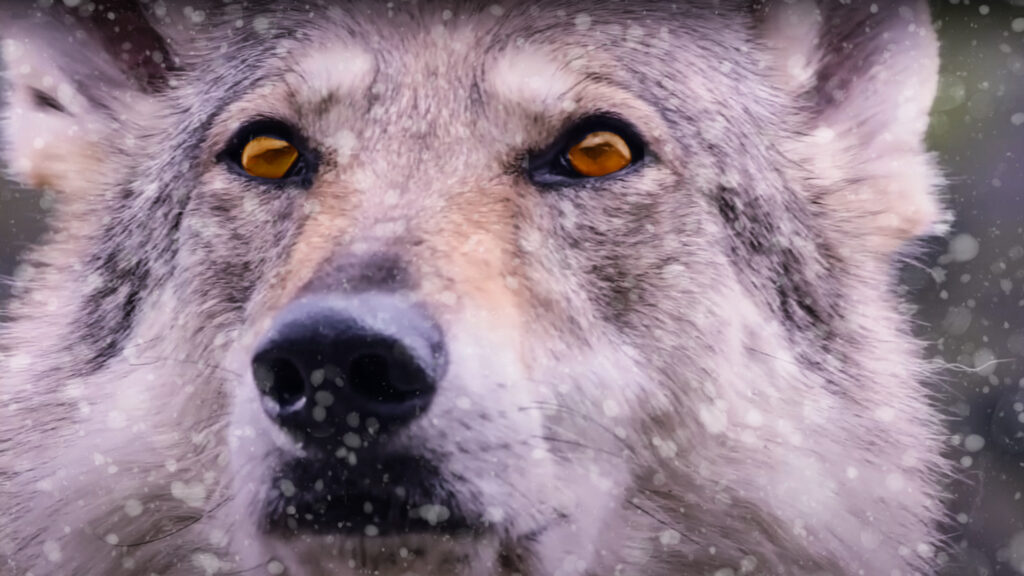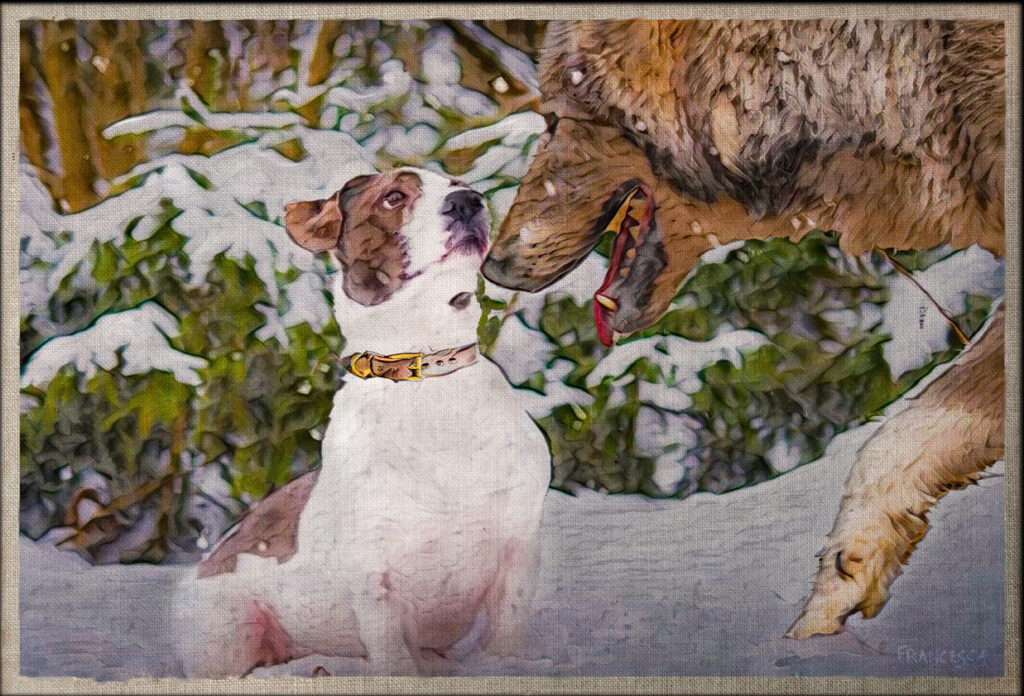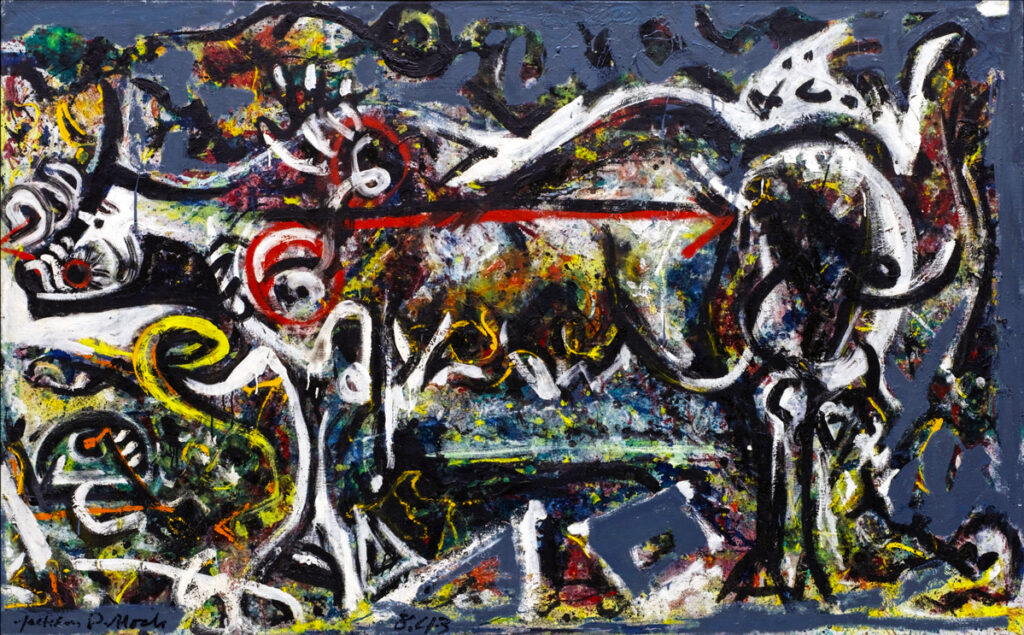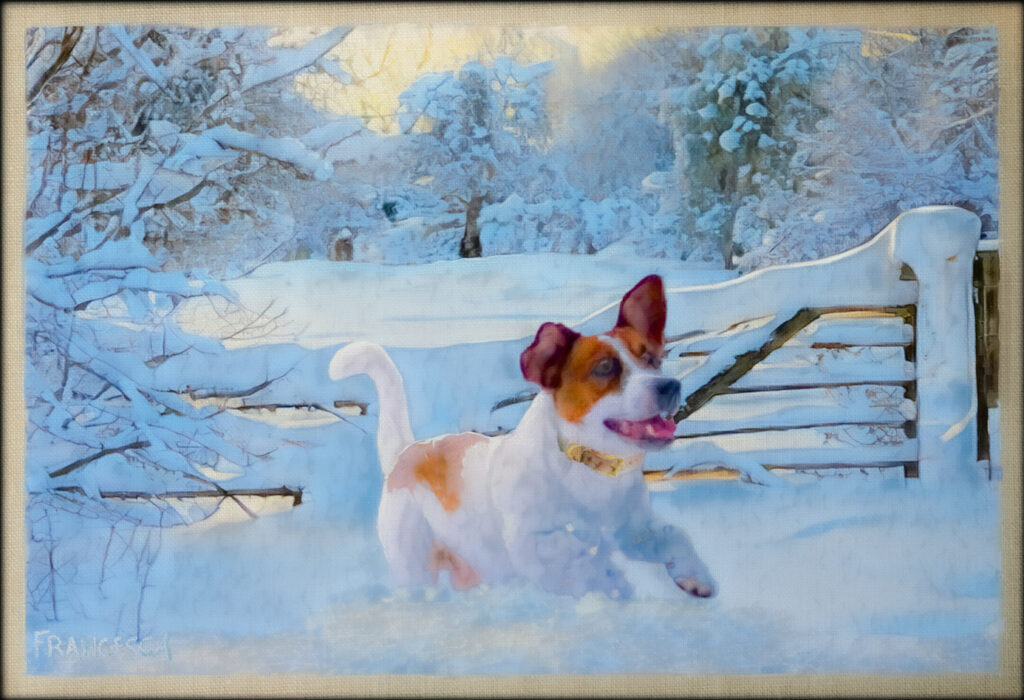
A STARVING wolf, nothing but skin and bone, scours the winter forest for weeks not finding food, till hunger drives him nearer and nearer town. Suddenly, right in the way, here’s a roly-poly dog, bounding about in the deep snow, happy as Larry. The wolf halts and sits motionless, watching the dog through hungry, half-closed eyes. Better than berries. Harder to catch.
‘Bow-Wow! Hello,’ the startled dog exclaims, stopping to stare wide-eyed at the scrawny, long-shanked wolf.
The wolf stares fixedly back.
“My name is Waffles,” the dog announces. He rests his plump haunches on the crusty snow. “What’s yours?”
The question is to such a creature. Waffles straightaway knows it. Stupidly, he hears himself say:
‘You look like you could use a good feed. Your bones are sticking out.’
The wolf doesn’t reply. He sits, some few metres away, shoulders hunched against the wind, jaws closed, studying the dog unblinking.
‘Come home with me,’ the dog blurts out, unsure why—perhaps some mix of genuine desire to help and simple showing off. How must it feel for a dog to gain the admiration of a wolf?
‘My family are good people,’ the dog continues. ‘If you let me introduce you, I can persuade them to take you in. We can be friends. You’ll have a home the same as me—a fireside to sit by, a warm cosy place to sleep, and every morning, a big delicious-smelling bowl of food. I get chicken necks, bones, biscuits, cakes, little treats throughout the day. Lots of pats and caresses. Wouldn’t that be heaven for an old . . . well, for a forest fellow like yourself?’
The wolf tilts his head to one side. He shakes a sparkling halo of loose snow from his thin patchy coat. The bold little dog still looks him straight in the eye. The dog’s eyes are bright, well-fed. Waffles, bowled over by the presence of a real-life wolf, feels no longer in his body.
But now, without warning, the wolf slinks forward. Waffles holds his ground. His haunches quiver on the snow. The wolf, huge in size, eyes as orange as sunset, comes right up and sniffs him. Waffles can smell the hot stale breath of hunger, the musky sweetness of the animal’s fur. In slow slow-motion, the wolf scrutinises him. Waffles, desperately trying to appear fearless, returns the creature’s gaze.
‘What’s this?’ finally the wolf asks.
‘Wha . . .what’s what?’ Waffles mutters, trembling.
‘Around your neck?’

The story of The Dog and the Wolf was doing the rounds long before its attribution to Aesop, 2500 years ago. The wolf gives the dog one last intensive sniff which the trembling dog politely ignores. Then, rather than accept Waffles’ kind offer of food and a warm fireside, the wolf lowers his head and creeps dejectedly back into the forest. Moral: ‘Freedom is our first imperative. Always choose freedom over captivity.’
That’s the story as it’s usually told. But what about the untold part? What about the dog? For a few harrowing moments, Waffles fears he’s about to be eaten. Then, as abruptly as the danger appeared, it’s past. The threat is gone. Left alone in the empty snow, traumatised and in shock, Waffles wonders what on earth just happened. What mysterious creature did he just encounter?
All dogs, no matter how cuddly, playful or pocket-size, have wolf blood in their veins. Wolves are the stuff of myth and legend for dogs. Every dog secretly takes pride in its wolf ancestry—Waffles included. It’s what humans love about dogs, even when we tease or make fun of them. Perhaps especially then. The howls of wolves no doubt colour Waffles’ dreams. But never before has he been up close to one. Not face to face. It is an unbelievable miracle that such a creature actually exists. Waffles feels flushed with a mix of terror and uncontrollable excitement.
Trotting home, he notices his neck stretching against the collar around it. He’s rarely questioned its presence before. Once, he’d felt choked by it. But not anymore. He had even begun to take comfort in it. Yet the wolf had found the thing repugnant. It had made him tense up and his mouth go dry. He backed away, looking sheepish and hangdog. The effect gave Waffles a sense of power, like holding up a cross in front of Dracula. But now, looking back, the wolf’s reaction seems to Waffles more like sadness than defeat. How could that be, when Waffles was only trying to help the creature?

‘Help? What was I thinking?’ Waffles asks himself: ‘What was I doing, inviting a wolf to tea? Talking my way out of trouble most like. What sane dog invites home a wolf? The family would be scared out of their wits. They’d never forgive me. Eyeball-to-eyeball with a savage wild wolf—I’m lucky to be alive.’
But as home comes in view, so does the gate—the gate he hurdled with ease an hour ago. It is half-buried in snow. For the first time ever, Waffles has done the unthinkable. Run away from home. He’s a dog who prides himself on his obedience. Loyal to the core. ‘Sit,’ and he sat. ‘Stay,’ and he stayed. He could spin, roll over, play dead. But the call of this particular snow-covered morning, sparkling and tinkling like a million crystal chandeliers, got into his legs and caused them to up and carry him away.
‘And,’ he reflects, ‘if I hadn’t jumped the gate, if I hadn’t gone out to the forest, well . . . I’d never have met the wolf. I’d never . . . never . . . have found out.’
Found out? Found out what? He can’t exactly say. He just knows he’s not the same. He’s changed. Life isn’t what he thought. Home isn’t what he thought. The wolf’s very existence calls everything he has ever known into question.
Waffles may be safely back inside the gate, but his legs, for better or worse, have enticed him out to a place of no return. He has met something he wasn’t supposed to meet. A conversation in a language he can’t understand. Now his faithful legs are bringing him home. But not all of him. Some part still remains in the forest.
Long ago—it seems almost in another life—he jumped the gate as Waffles the dog. But who or what comes home? It’s a creature wearing a dog costume, calling itself Waffles. And when he tells the other dogs the story of how Waffles met the wolf, no dog will believe him.

